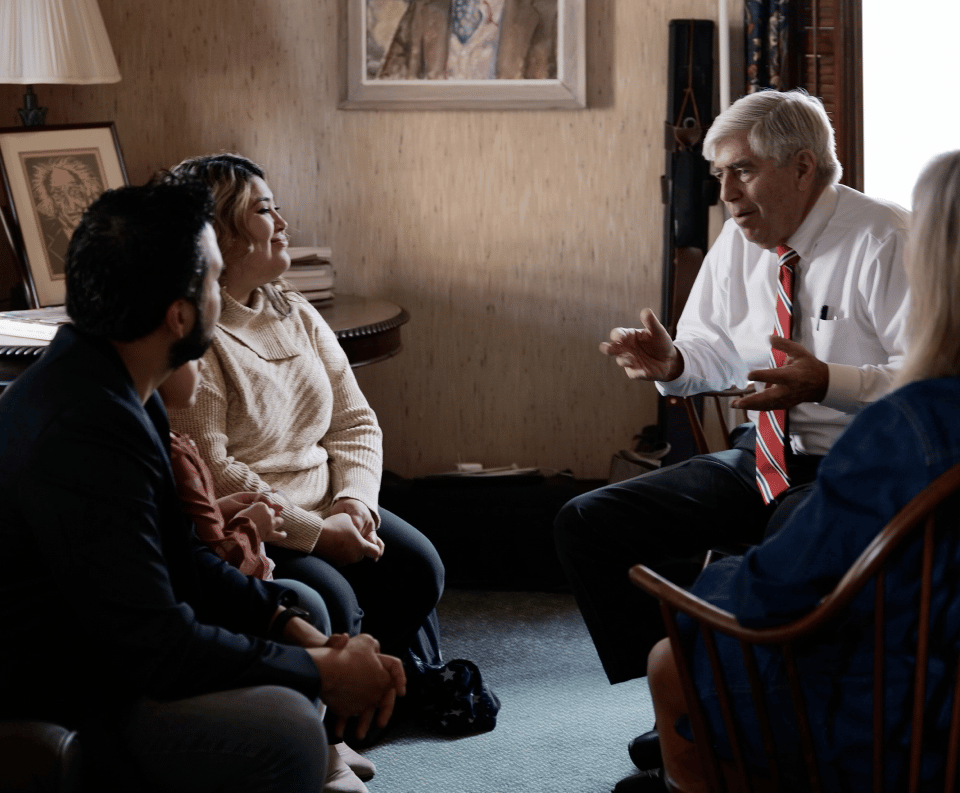
We understand that the legal process is confusing and stressful for most people, so we work to answer every question and put every client at ease. These Frequently Asked Questions (FAQs) cover some of the basics, but should not be substituted for consultation with an attorney about the unique circumstances of your case.
We will be in a better position to evaluate your case if you bring key items with you: your insurance declarations page (that shows your insurance coverage), the police report or defendant’s information, photographs of the accident, and any pertinent medical documents. For medical documents it is helpful to have any out-of-work notes, ER discharge paperwork, prescription receipts, and referral orders.
Our firm, like most personal injury firms, works on a contingency basis. That means we don’t earn a fee unless we get money for you. Our fees are based on a percentage of the amount recovered. While our fees are contingent, the costs associated with the case are the client’s responsibility regardless of the outcome, though many times we will advance these expenses and deduct them from the award. Those costs include expert witnesses, depositions, filing fees, and serving subpoenas. Costs vary depending on the complexity of the case. Medical malpractice cases, for example, often require expert testimony.
The total amount of expenses is based on the complexity and longevity of your case. An automobile accident case that settles in a matter of months will cost significantly less than a complicated medical malpractice or wrongful death case. We will consult with you prior to advancing any substantial costs.
Every case is different. Factors that can impact the value of a case can include the facts of the accident, the extent of your injuries, the amount of time lost from work, and impact on your future health and well-being.
At the beginning of a case it is difficult to estimate the value, but as the case progresses, we will be better able to discuss with you what your case is worth.
It depends on a variety of factors. The type of claim, degree of injury, and the position of the insurance company or defense lawyer can all affect how long it takes for a case to conclude.
With limited exceptions, persons over the age of 18 must file their lawsuit within 2 years of the incident date to protect the statute of limitations. The statute of limitations, however, is different for minors.
Every claim has an “expiration date” from the time it happens until you are no longer able to bring a claim. This “expiration date” is known as the statute of limitations. In Virginia, persons over the age of 18 must file their lawsuit within 2 years of the incident date to protect the statute of limitations. The statute of limitations, however, is different for minors.
It is important to consult with an attorney as soon as possible so that we can investigate your claim before filing a lawsuit.
Mediation and arbitration are two methods for settling cases without the expense of going to trial. Mediation tends to be less formal, and is used more frequently than arbitration for personal injury cases.
Mediation uses a neutral third party to act as a guide or negotiator. Often, the mediator is a retired judge who can offer insight on how a jury might decide a case. During sessions, the mediator meets with each side privately to facilitate negotiations. The parties may not come to an agreement during mediation.
Arbitration is generally more formal than mediation. Both parties are given an opportunity to explain their position to the arbitrator, who then renders a legally binding decision which both parties must honor.
Once your case has been evaluated and a decision is made to proceed, you and your lawyer will gather all the information needed to either settle the case or take it to court.
When you hire an attorney, the insurance adjuster is no longer allowed to contact you directly. We know that dealing with adjusters can be a hassle, especially when you are trying to get your life back together after an accident.
If you are still getting medical treatment for your injury, we will postpone attempting to settle your case until your treatment is complete or you reach “maximum medical improvement.”
If you are injured in an accident, you need to seek medical treatment right away. If you postpone getting treatment, you might make your injuries worse. Even worse, the insurance company will use your behavior as a defense to the case. They might claim that you were not injured in the accident, but at some later time through no fault of their insured.
No. You should seek a doctor based on your personal preference, health insurance benefits, and convenience, not based on your case. Insurance adjusters and jurors are suspicious of doctors who get involved in a client’s treatment as the result of a lawyer’s referral. You should see a doctor that you feel comfortable with and will give you the treatment you need for your injuries. One exception is that if a person has a worker’s compensation claim, usually they have to see the doctor recommended by the workers compensation insurance carrier.
The lawsuit is filed against the individual that caused the accident or injury. As part of their insurance contract, the insurance company is required to defend the claim on behalf of their insured. So while the suit is in the individual’s name, the insurance company is the one making the decisions and ultimately paying the settlement or verdict.
Liability insurance covers you if you are at fault in an automobile accident that resulted in injury to another person. This coverage protects your personal assets. While Virginia only requires $25,000 in liability coverage, that amount is often insufficient to cover a serious injury. Given today’s high medical costs, a moderate collision can cause injury in excess of $100,000, which is why it is important to carry coverage well beyond the required minimums. Effective January 1, 2022 limits raised to $30,000 per person and $60,000 per accident.
MedPay covers the medical bills of you and the passengers in your vehicle after an accident, regardless of who is at fault. MedPay is designed to help pay for immediate and short-term care. It is often used prior to health insurance for accident-related treatment. MedPay generally covers reasonable and necessary expenses for medical, surgical, dental, and chiropractic treatment. It also covers hospitalization, ambulance services, X-rays, nursing services, prosthetic devices, and funeral services. It is no substitute for broader health insurance, however, as few companies are willing to sell more than $25,000 worth of MedPay coverage. Even if you have health insurance or belong to an HMO, having MedPay is a good back-up plan.
Once you sign a release, you are settling with the insurance company and can no longer file a lawsuit for your claim. The property damage and personal injury cases are often distinct, and so signing a property damage release will not hinder your personal injury case. You should never sign a personal injury release until your injuries are fully treated. If you are uncertain whether or not you should sign a release, you should contact an attorney.
If you are planning to hire an attorney, you should not sign the medical authorizations sent to you by the insurance company. Even if you are handling the case on your own, you can send the medical records to the insurance company yourself, and you do not have to sign a release.
Once we begin working on your case, our office will be in charge of collecting all of your medical records, and we will send the accident-related records to the insurance adjuster once you are finished with your treatment and we are ready to make a demand. Likewise, if you are filing a claim under MedPay, we will send your records to the MedPay adjuster in order to get your check for medical benefits as soon as possible.

One of the oldest and most experienced personal injury law firms in Virginia.
LEESBURG – (703) 777-1650
105 Loudoun St., SE Leesburg, VA 20175
MIDLOTHIAN – (804) 794-0080
1527 Huguenot Rd., Suite 201, Midlothian, VA 23113
ORANGE – (540) 308-4080
104 West Main St., Orange, VA 22960
WINCHESTER – (540) 667-3500
14 South Kent St., Winchester, VA 22601
CULPEPER – (540) 308-4080
609 S. Main Street, Suite 203, Culpeper, VA 22701
HOPEWELL – (804) 458-7070
224 North Main St., Suite 360, Hopewell, VA 23860
RICHMOND – (804) 415-4531
6 West Broad St., Richmond, VA 23220
© Copyright 2025 Burnett & Williams, P.C.